#film contemporan
Explore tagged Tumblr posts
Text
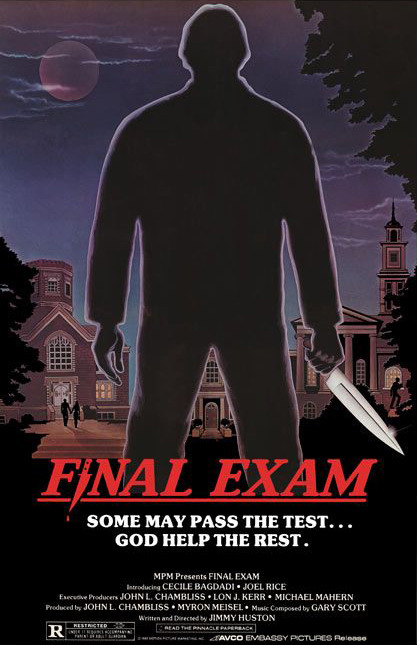
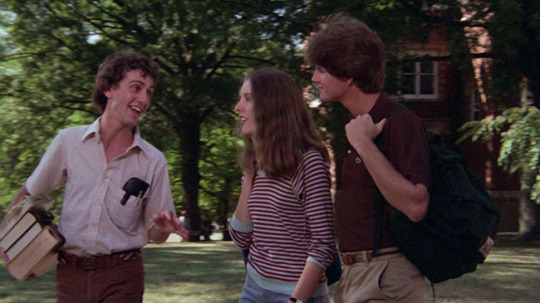
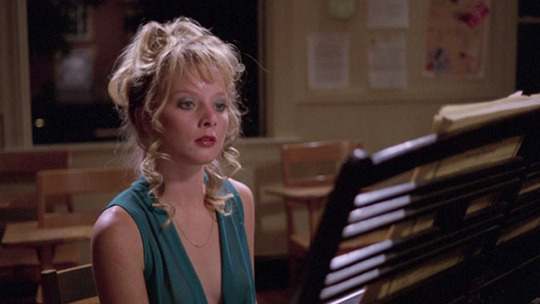
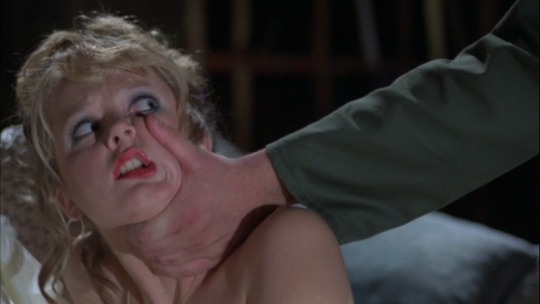
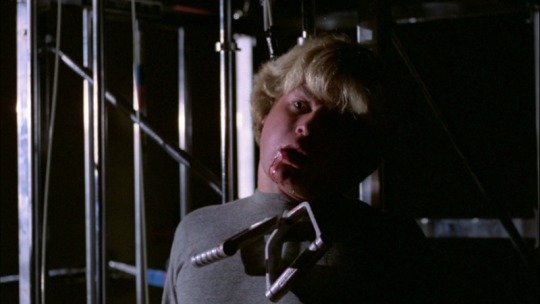

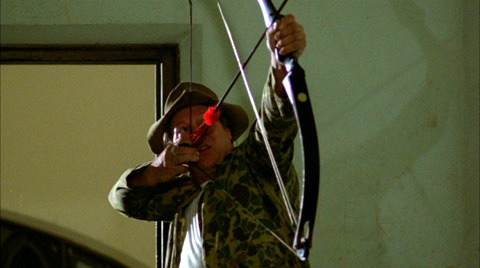
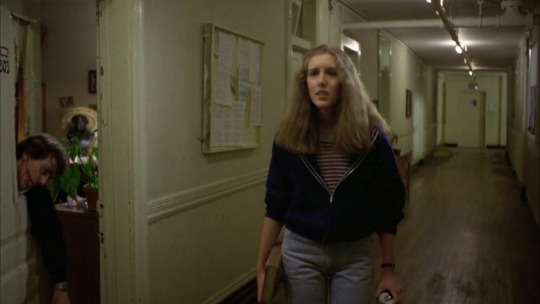


Final Exam (1981)
"Why are you so apprehensive? When are you going to realise that the whole world isn't made of psychopaths skulking about?"
"But they are out there. They do exist. People are killed every day for no reason at all. Perfect strangers wake up in the morning and decide, 'Hmm, I think it's a good day to snuff somebody". And these are people who eat at our restaurants with us, use our highways and vote for the President, which probably explains something about him, too. I'm not paranoid. I'm just facing unhappy facts."
#final exam#1981#slasher film#video nasty#blood tw#knife tw#american cinema#jimmy huston#cecile bagdadi#joel s. rice#ralph brown#deanna robbins#sherry willis burch#john fallon#terry w. farren#timothy l. raynor#sam kilman#don hepner#mary ellen withers#carol capka#gary s. scott#unexpectedly slow burn for a golden age slasher; invests an inordinate amount of time into developing its characters which is something i#usually really appreciate in my horror‚ but the script and some of the performances can't always prop up that glacial pacing#also unusual in having a killer who is resolutely just Some Guy: no othery semi paranormal big bad here‚ no layered and tragic figure#with a rich backstory and a ready made lore. he's just a dude (with a bowl cut) who kills people for reasons that are never explicitly#stated. which is interesting! but a lot of this is by the numbers slashering‚ and at that it doesn't exactly stand out from the crowd#there is a nerd character called Radish who's very interesting tho (or rather how the film treats him and what it does with him is#interesting and quite unlike other contemporaneous nerd characters in slasher cinema). by no means a bad entry in the canon#but neither is it a particularly notable one and it would probably have been forgotten entirely if it hadn't ended up on the dpp list#there are better slashers in academic settings: Prom Night and Slaughter High tread this route more entertainingly
14 notes
·
View notes
Note
Miss Tracy, do u have any advice on researching a specific time period?
(also I know u probably won't see this, but I love your art and you are awesome)
Look for books about the time period, but also books written contemporaneous to the time period, whether fiction or non-fiction. Check used book stores for out of print gems at good prices.
If photography was a technology that existed in the time period you're researching, look for photos of people doing everyday things. Take in the context, the geography, the economic situation. Look at how they're dressed and what their clothes say about them.
Newspaper archives. Sometimes newspapers of the past are free to browse. Sometimes you have to pay for access. Old shopping catalogue collections - if they exist for your time period - are great too.
Documentary films about time periods, or specific events in a given time period can be useful, even if only for a broad overview.
Museum exhibits - helpful whether you're looking for famous paintings or artifacts of past civilizations in a world renowned institution, or trying to dig up something impossibly unique in an oddity denture museum in some forgotten place in the Midwest. If you can't go in person, check online. You can find museums with vintage clothing or household appliance collections from even a few decades ago. Some museums have extensive, searchable online collections too. Take the Metropolitan Museum for instance.
If you can visit historical sites relevant to your area of interest, do it! Do those little guided walking tours. Do the ghost tours even - they're often fairly history-centric with some paranormal folklore for added spice. Sometimes they get you access to places you otherwise can't enter. Check historical societies local to cities or towns of interest.
If you need information about something deeply specific, check the internet for communities that form around that deeply specific topic. I've found tidbits of useful info searching around old forum posts from radio enthusiasts, Model T owners, and people who collect old telephone booths. (Granted, it's getting harder to search for this kind of stuff nowadays.)
-----------
Be careful of AI trash, whether it's generative images, text descriptions, or entire articles. Don't rely much on film or television for accuracy. Some things are more interested in being accurate than others, but there's almost always some artistic license taken. If you're trying to be particularly accurate about something, triple check it for confirmation. Misinformation has had a way of spreading like insidious mildew even before AI started disseminating it with delusory authority.
Lastly, if you don't enjoy doing this kind of historical research like a weird little detective-creature, consider loosening up on the 'historical' aspect of your writing. It's okay to not focus on historicity in your fiction. But if you're going to dive in whole-hog on history, bear in mind it's an ongoing, often time-consuming adventure in information-finding.
(Thank you for the kind words!)
1K notes
·
View notes
Text
everybody wants to do nostalgic 2000s throwback but nobody wants to acknowledge that the tori amos adrien brody foot fetish transformation music video was dominating the airwaves. you complain about the ripple effects of the dresden dolls but nobody even remembers the baroque chamber pop moment. it was precursor to the gregorian chants thing and contemporaneous with riverdance like come on. ticket scalpers were making a killing at loreena mckennit concerts. everybody was taking style cues from like lord of the rings liv tyler and titanic kate winslet. this was happening at the same time as tlc no scrubs, karen kusama aeon flux, zaha hadid transitions lenses apple store blobject futurist architecture, that 70s show reruns and swing dancing revival, which was distinct from 90s rockabilly because they took the tattoos out of the scene and now mormons could do it. spike jonze and michel gondry spun bjork music video careers into underground cult hit films largely constructed out of felt. yann tiersen and jon brion were scoring blockbusters. jhonen vasquez had just booked a huge merchandising deal with hot topic. and then owl city dropped just as frogurt was having its limelight in the post-TCBY landscape while kmart filed chapter 11 bankruptcy. i've yet to see anybody adequately recreate the chaos
226 notes
·
View notes
Text
The Telegony is overhated
I wanted to briefly share my thoughts on a particular topic. Ever since the musical Epic went viral, there has been more fans taking an interest in Greek mythology, which is fantastic! However, I’ve recently noticed many rants about a specific work of Greek mythology called the Telegony. While it’s perfectly fine for individuals to have a preferred interpretation of a story, insulting people, books, or films simply because they reference the Telegony seems excessive. It’s okay not to like a particular work, but dismissing its legitimacy just because it doesn’t align with personal preferences is problematic.
What is the Telegony?
The Telegony is a lost narrative that covers the final episode of the Epic Cycle and focuses on Telegonus, the son of Odysseus and Circe. We don’t know who wrote the Telegony or when it was composed. Possible authors include Eugammon of Cyrene (6th century BCE) and Cinaethon of Sparta (8th century BCE). Some ancient sources even claim that Eugammon stole the work from Musaeus, a mythological figure whose existence is uncertain. Additionally, the Telegony might consist of two separate poems—The Telegony and Thesprotis—that were later combined.
The claim that the Telegony is merely “Odyssey fanfiction” written centuries later is misleading. We have no definitive evidence of its age. Eugammon lived 100–200 years after Homer, while Cinaethon might have been older, contemporary with, or younger than Homer. It is difficult to tell since we don’t even know if Homer was a historical person, and if so, when he lived. Interestingly, even the ancient Greeks were uncertain about the authorship of the Telegony as well, and there’s a possibility it is as old as or even older than the Odyssey. Not to say that I find it likely, but as I said the claim that the Telegony is Odyssey fanfiction is very missleading.
Why Do People Dislike the Telegony?
Many people dislike the Telegony because it disrupts the happy ending of the Odyssey. In this narrative, Odysseus is visited by his illegitimate son, Telegonus, who accidentally kills him. Subsequently, Penelope marries her husband’s killer, and Circe marries Telemachus, the son of Odysseus and Penelope. Before that, Odysseus kinda ditches his wife and marries queen Callidice. Then he led the Thesprotians in a war with their neighbors the Brygoi and defeated in battle the neighboring peoples who attacked him. Only when Callidice died, Odysseus returned home to Ithaca and his wife, leaving their son, Polypoetes, to rule Thesprotia.This storyline upsets those whose personal interpretation, or “headcanon,” aligns with a more traditional resolution to the Odyssey.
However, it’s important to note that Homer is not the sole authority on Greek mythology. He did not invent the Trojan War, Odysseus as a character, or Greek mythology as a whole. His works are based on oral traditions, which likely served as the same source material for the Telegony. The reason Homer’s works are so prominent today is that many contemporaneous works did not survive into modern times.
The Telegony is also not the only source which makes Penelope/odysseus cheat and give them an unhappy ending. For example:
In early sources like Pindar, Apollo and Penelope are said to have fathered Pan together.
Herodotus, Cicero, Apollodorus, and Hyginus all claim that Hermes and Penelope were Pan’s parents.
Pausanias recounts a story where Penelope was unfaithful to Odysseus, leading him to banish her to Mantineia.
Other sources suggest Penelope had relations with all 108 suitors during Odysseus’ absence, resulting in Pan’s birth.
These accounts contradict Homer’s Odyssey but are still part of Greek mythology because it wasn’t a unified belief system. Greek mythology includes everything the ancient Greeks believed, regardless of age, author, or origin. Many Greeks believed in Telegonus and wrote about him, making his story a legitimate part of Greek mythology.
The Telegony and Homer’s Time
The Telegony narrative very likely existed even during Homer’s era, even if we exclude the possibility that its author was Homer’s contemporary. Hesiod, one of the most influential writers of ancient Greece and likely a contemporary of Homer, mentioned Telegonus:
“And Circe, the daughter of Helius, Hyperion's son, loved steadfast Odysseus and bore Agrius and Latinus, who were faultless and strong: also, she brought forth Telegonus by the will of golden Aphrodite. And they ruled over the famous Tyrrhenians, very far off in a recess of the holy islands. And the bright goddess Calypso was joined to Odysseus in sweet love, and bore him Nausithous and Nausinous” (Hesiod, Theogony, 1003–1015)
Odysseus’ infidelity to Penelope was not a later invention intended to tarnish his character.
Interestingly, the Odyssey could possibly itself hints at the existence of Telegonus. For example, Teiresias tells Odysseus that he must journey inland with an oar on his shoulder until he meets someone who doesn’t recognize it. While the purpose of this journey isn’t clear, it’s notable that Odysseus must make a sacrifice to Poseidon far from the sea—a theme that aligns with the Telegony. Apollodorus also describes Odysseus undertaking a mainland journey to Thesprotia, where he makes a sacrifice to Poseidon.
Teiresias further states that Odysseus will return to Ithaca, where he will die:
“And death far from the sea, gentle and painless, will come upon you in old age.” But the thing is, this sentenece and prophecy is higly ambigious. It could also mean: „And death to you from the sea, yourself, harmless– quitesuchlike– will come, which will slay you, by sleek old ageworn.“
This could be a reference to Telegonus, who comes from the sea and causes Odysseus’ death. The Odyssey ends abruptly before describing Odysseus’ final journey, leaving room for interpretations. After Odysseus recounts the “inland journey” to Penelope, he repeats Tiresias’ description of his death (Od. 23, 267–284). Though Odysseus predicted that Penelope would find the prophecy unpleasant (266), Penelope ignores the “inland journey” and focuses on the predicted old age of her husband (“if indeed the gods will bring about abetter old age at least,then there is hope that there will be for you an escape from evils”,286 287).
There is also the question of whether the Odyssey and the Iliad were written by the same author. What we do know is that the ancient Greeks attributed these works, along with many other poems, to a legendary figure named Homer. This attribution is why the Homeric Hymns bear his name, even though it is unlikely they were composed by the same author. In fact, many scholars argue that the Odyssey and the Iliad exhibit differences in vocabulary and style, suggesting they may not have been written by the same person. If so, than the Odyssey is probably the younger one of the two poets by a few decades.
29 notes
·
View notes
Text
“While attending Smith College from 1915 to 1919, the white girl crafted mixed-media diaries where she engages in epistolary soliloquies with an imaginary male interlocutor named ‘Jonathan.’ [...] A fear of morbidity pervades [Helena Edna] Davis’s letters to Jonathan, their self-accusatory tone as constant and troubling as that threading through Medora Espy’s contemporaneous diaries. Drawing on clinical terminology, Davis characterizes her ‘moods and strange feelings’ as symptoms of being ‘supersensitive or extremely sentimental.’ ‘Queer isn’t it?’ the nineteenyear-old muses, rhetorically conflating multiple vectors of divergence under perceived pathology. Davis goes on to describe herself as ‘supersensitive—or else crazy!,’ a ‘sentimental nut,’ ‘a huge joke,’ and ‘plain nuts.’ [...] Davis fleshes out this self-diagnosed deviance through film consumption. Her college diaries are dotted with drawings, newspaper clippings, stage programs, and amateur Kodaks, but only one image of a celebrity: Lillian Gish. A pocket-sized headshot, the sepia ephemera is collaged next to an entry where the moviegoer shares her secret ‘queer’ yearning: ‘I wish I were a man.’ Davis continues in a pressed speech, ‘I wouldn’t let Cora and Beth know it for the world. But there are times!—. . . I wonder, sometimes, that they don’t suspect. I hunger for it so, & they never understand!’ ‘Isn’t Lillian Gish appropriate up there?’ the girl blurts out at the end of her admission.”
— Diana W. Anselmo, from A Queer Way of Feeling: Girl Fans and Personal Archives of Early Hollywood (2023)
29 notes
·
View notes
Text

Transcript:
Who hell do you think you are? You’re any kind of artist? Anybody knows who you are?
Maybe everybody else wants to enjoy the peace and quiet. This is one of the most important places in North America, and who are you? Who are you? You miserable, presumptuous, no talent- you’re no artist. An artist respects the silence. It serves the foundation of creativity.
You obviously don’t have the talent. You don’t have enough respect for yourself or other people to know what it means to respect yourself, in music or any form of creativity, and I’m an NYU film school graduate. Sucker. And the school of visual arts in the academy of art university in San Francisco.
You suck. You’re a no talent. If you really have talent go practice and then get yourself a gig instead of ruining the day for everybody down here. You disgrace. You are everything that’s gone wrong in this world. You’re a self consumed, no talent, mediocre piece of shit. And I’ve earned my right to say it, okay? In 1975, I walked Bob Dylan up on stage. Who the fuck are you? I knew the Grateful Dead from 1966.
Who the fuck are you?
You’re nothing. You are nothing. And you will never be anything. Never. How dare you? You miserable mediocre nothing. Shame on you. You crack a stupid little smile, you little pimp. Go learn to play. You’re flat. You can’t even carry a fucking note. I don’t care about your little horn lip, it doesn’t mean you know how to play. You’re flat. I’ve trained classically, I’ve trained contemporaneously, and
you suck.
Audio source
Original video that's being referenced
#ultrakill#gabriel ultrakill#this one was so good it deserved a little effort. not too much though. you cant trick me into drawing that easily#pls dont ask why the style changes 3 times its just funnier that way (lie. i was testing brushes)#i need you to know that i go through these streams at work. and hearing this audio with 0 context almost killed me#filth was picked to be bullied because most enemies dont have mouths. filth also has no arms. which. makes it better tbh#no arms. no lips. worst trumpet player ever. asked to leave hell.#he doesn’t really do long requests so this one is probably the longest clip that will ever end up on here#voice post
398 notes
·
View notes
Text
IWTV S2 Ep8 Musings - The Ep8 Script (Pt1)
Thanks to slitwrstsavior sharing the script and @memorian for digitizing it! <3
Imma have to do this in chunks, cuz of Tumblr's 30-pic limit.

SHADE.



AMC. I'm finna smack y'all. I NEED those alternate outtakes! 😭🙏

😳 JACOOOOOOB! 😱

SIR ANDERSONNNNNNNNN~!!!!

You ain't have to commit to the bit like THAT! They said suck the BLOOD DROP on the FLOOR, not the effing ROCKS themselves! XD Your improvs are IMMACULATELY UNHINGED! 😍

This is VERY cool & interesting!


HH's OCD mirrors Lou's mad ravings during his PTSD unhinged Revenge Plot, but it's also really cool that he was from vinatge Hollywood, contemporaneous with Louis' film noir aesthetic in 2x7, AND HH's association with aviation, and Lou's dream learning to fly (a plane)--perhaps in honor of Claudia mad that Les wouldn't teach her to fly (with the Cloud Gift? 😭💔) NO ONE EFFING TOUCH ME!


Ahhhhhh~! They're his triggers; AND his reset-buttons. U_U

He was finna KIIIIIIILLLLLL Lestat, IKR!? XD

I love how the use of ellipses can stand for either interruptions (Louis shushing him) or deliberate pauses (Armand actively tryna think of a lie).

Rolin's goofy arse. XD He really meant it when he said he wanted Dan's music to come in clutch.
Can't help but notice that it's SILENT during this part though. The "tense" film noir music only starts AFTER Louis' finished speaking. Which I think was a better choice. Let Louis' words sink in--HIS voice is the only one that should matter. THEN let the music come in. 👌


I EFFING KNEW THAT WAS HER ASHES OMG!? That ain't LIPSTICK!


I'm STILL MAD we didn't effing SEE the ear/jaw. But thank you for the movie nod from Akasha's BAMF exit.



Ahhh, that answers my question about if Louis was still using the Fire Gift from halfway across Paris--that is AWESOME, wow!

[EDIT] Forgot to add this in, cuz AMC!Lou's officially OP:


EXCUSE YOU!? Since when did Santiago know Armand's birthname!?

So either: Armand told Santiago his backstory, OR Santiago stole it from his mind (highly unlikely), OR he eavesdropped Loumand. SNAKE!

There's a typo--it should say "They are there to...." Which they took out anyway, and good riddance; Lou immediately cuts him off, cuz ain't nobody tryna hear your effing excuses, a-hole.

I DO wanna hear what he would've said though--pour some more Kool-aid down everyone's throats whydontcha!? "I knew the wisdom of the Great Laws," as if! I NEED to know what REALLY went down with the coven in S3--Imma make a separate post, cuz I have so many questions, that this Ep8 script unfortunately is NOT answering.

SUFFER, bish.

Imma cut off right here, and make a separate post.
#interview with the vampire#iwtv tvc metas#louis de pointe du lac#loustat#justice for claudia#must see tv#the hype is real
24 notes
·
View notes
Note
ok maybe this is just me BUT. the thing i disliked the most about triangle of sadness was the vomiting scene. it seems to be a trend to use large amounts of vomit or diarrhea in art movie these days and i'm not even emetophobic or anything (i'm literally bulimic) but it feels so forced and gross for absolutely no reason. it doesn't feel like it's making a point or accomplishing something deep. it just feels like an eleven year old making fart jokes.
that was ultimately a really frustrating sequence to me, and one that i think is emblematic of a lot of the film's shortcomings. initially i thought it could go in a few different directions—using bodily functions as symbolic of the way wealth can produce misery even for those who have it; using the breakdown of a fine dining scene as a microcosm of the capitalist class's attempts to ignore crises that are occurring right in front of their faces; using the juxtaposition of waste and opulence to say something about the cost and production of luxury. i could have gotten interested in any of these reads, or others; there's a lot to say about how and when we depict bathrooms, excrement, &c onscreen.
however, i think 'triangle' ultimately gets stuck on a pretty superficial "eat the rich" line, and the whole food poisoning sequence end up being indicative of this sensibility. i'll go ahead and compare it to 'succession' because they're contemporaneous, about the ultra-wealthy, and depict bodily excretions. however, what works for me about the bodily functions and fluids on 'succession' is that the show is much more interested than 'triangle' in the psychologies of its characters. invoking piss, shit, or vomit on that show generally tells us something about their emotional states; it's also effective because we see specific ways in which those characters are uncomfortable with the idea that they have bodies, and continually try to deny them. 'triangle' doesn't develop its characters nearly so well (the most developed are both models, ie people who in fact are intimately aware of their own embodiment), so when we see them vomiting and shitting uncontrollably, it's not so much a psychological beat for them as it is an ostensibly cathartic (for us) way of humiliating these wealthy villains. this ties in with the film's suggestion that the characters have brought the food poisoning on themselves (by demanding the staff entertain them, thus causing the food to sit out too long), which give the whole vomiting sequence a pretty moralistic tone, like we're supposed to be smugly watching them get their comeuppance.
using incontinence specifically in this way is pretty casually ableist (again, it's less a psychological point where we're meant to understand that the characters themselves see this as particularly humiliating, and more a didactic point where we're invited to gawk at the spectacle of these people losing control of their bowels because they 'deserve' it), and it's consistent with an overall sensibility throughout the film that invokes superficial regurgitations of anti-capitalist politics and transforms them into mean-spirited retributive 'justice' presented as catharsis. there are numerous points in the third act specifically where it seems the film is interested in using the 'uninhabited' island setting as an opportunity to question and problematise established social forms by dialectically contradicting them—the flip in carl and yaya's relationship, abigail distributing resources to those who labour for them, the way carl being coerced into a sexual relationship and jarmo killing a donkey make explicit the positions they were perviously implicitly occupying in wealthy society as, respectively, a model and a tech mogul.
however, the film really fumbles an opportunity to do much of interest with this setup, because it's never willing to go beyond its insistence on punishing its characters for their previously luxurious existence. carl gets a partner who's using his body rather than his wallet and instagram followers, as he perceived yaya was doing. paula is stripped of her managerial role and treated like an employee, plainly echoing how she used to talk to abigail and the others. jarmo and dimitry are placed in a situation where they can't make themselves valuable by wealth, and instead must become bodily resources if they want to survive. none of this is developed or goes anywhere—it's stuck on, again, a sensibility of punishing the characters. i don't get the sense that anyone writing this film was interested in how these social forms come to exist, what sustains them, how they might be altered or broken—instead it's just a series of unsubtle attempts to match each character 1:1 with a suitable comeuppance. this is also why abigail, by far the most interesting character in the film, is so underdeveloped (to the point of not even existing until act 3!) and why the film doesn't succeed in saying much of interest about how, eg, racism or ableism produce and interact with structures of class exploitation. the most it can do is gesture in the direction of the things it wants to talk about (nelson and therese are both written really disappointingly in this respect).
i don't really find any of this cathartic, and it's often so heavy-handed as to strain credibility (every scene with the weapons manufacturing couple). ideologically it's deeply moralistic in a way that is incapable of saying much beyond a condemnation of rich people (which is not the same as a condemnation of riches, or the social forms that produce them). although i didn't initially read the food poisoning sequence as funny, in retrospect i do think it was intended that way—which is, again, ableist in a pretty insidious way, and is also just not really successful imo as a piece of comedy. as a film it's really no more interesting or insightful than any of like a thousand other milquetoast gestures toward the same superficial understanding of capitalism as little more than a result of wealthy people being greedy or lazy. justice (a better film) for abigail 2k23
67 notes
·
View notes
Text
#30 - 'Sofia's Song' (non-album track, 1998)

It’s hard to know what defines us. Consider this: you die. Instead of passing through to the afterlife, your spirit enters the gangly, hunched body of a New York Times obituary writer. That body’s boss storms into the room. Quick! She – you – just passed. No time to waste or the grubby mitts over at WaPo will get the jump on the announcement. You have five minutes to bash out the final word on your own life. No time to think too hard. Do you write that you were:
‘...a visionary director, screenwriter and actor, known for her explorations of liminality and the pains that characterise the human experience. Her sophomore film, 2003’s Lost in Translation, propelled her to critical and commercial stardom; well-received follow-ups including The Beguiled (2017) and Priscilla (2023) further cemented her status as a prodigy of modern cinema. Revered by her friends, family and peers, she is survived by her two children and a lifetime of filmic excellence.’
or do you write that you were:
‘a visionary director, screenwriter and actor, whose single greatest achievement was that Sufjan Stevens wrote a song for her.’
You would pick the first option, of course. And you’d be wrong. That was the wrong option. Coward.
‘Sofia’s Song’, the third of three extant ‘name songs’ that Sufjan produced during his time at Hope College, is much closer in voice and narrative to ‘Julia’ than it is to the more intimate ‘Jamila’. This is the second song from this era dedicated to a famous woman that Sufjan can only view from afar. In ‘Julia’ the barrier was time; in ‘Sofia’s Song’ the barrier is fame. We can only presume that Sufjan does not, in fact, know Sofia Carmina Coppola personally, just as he does not know Julia Prinsep Jackson. The odd thing about ‘Sofia’s Song’, though, and the thing that differentiates it the most from ‘Julia’, is that here he doesn’t quite care. ‘Sofia’s Song’ is a song of revelry: it dances in the living light of absurdity, of the irrationality that comes with writing a song for somebody who will never hear it, and it therefore strangely emerges as one of his most overtly self-aware pieces of songwriting. ‘Julia’ yearns for the impossible; ‘Sofia’s Song’ yearns for impossibility. There is a difference! Subtle, but it’s there.
We will get there in due time. First, however, cast one eye to the musical elements at play here. Play ‘Sofia’s Song’ right after the other two ‘name songs’ and something will become apparent: the production quality is remarkably strong. So strong, in fact, that one wonders whether ‘Sofia’s Song’ was developed for possible inclusion on a then-hypothetical full length debut. When Sufjan released this song online in 2009, he confirmed its provenance as one of many completed tracks from his final years at Hope College; ‘Sofia’s Song’, however, even beats contemporaneous gems like ‘Happy Birthday’ and ‘A Winner Needs a Wand’ as far as clarity, fullness and percussive crispness go. This is not a very difficult tune to put to tape, granted. We have one banjo and a handful of vocal overdubs to contend with here. But listen to how plucky that banjo figure sounds! Or how full-bodied Sufjan’s vocals are! There is nary a hint of tape hiss, nor a false start or an instrumental flub in any part of the composition. As far as 1990s Sufjan is concerned, it’s a level of care only afforded to the orchestrated centrepieces on A Sun Came, and beyond that, transitional songs like ‘Damascus’ and ‘Woman at the Well’.
I belabour this point because it offers one key insight: ‘Sofia’s Song’ is far more than an initial sketch or recording demo, and that suggests to the astute observer that Sufjan liked this one. He may not have known exactly where or how to release it, but there was something worth carefully preserving here. Even the complex, climactic melody that accompanies the ‘I don’t care what you say!’ lyric, replete with broad vocal harmonies, feels very closely considered – more so, at least, than any moment in ‘Julia’ or ‘Jamila’. This does not necessarily make ‘Sofia’s Song’ a better song than that aforementioned pair, but it really does seem that Sufjan was of that opinion. It was even the first song he publicly released from his ‘name song’ era. Why? What makes ‘Sofia’s Song’ special?
Is it because of the music? Unlikely. Which is not to call it bad – the vocal line has a habit of lodging itself in your head for days on end – but it is, generously, rather standard. The arrangement is sparse and straightforward, a single banjo plucking out arpeggios that do not amount to much more than a chordal accompaniment. This leaves the melody to do the heavy lifting, and it is infused with the same sort of major key naïveté that one can find across much of his early work. Simplicity is the name of the game with this one – and so it is with ‘Chicago’ and ‘Mystery of Love’, among many other Sufjan songs, but those ones feel like the end result of a decades-long search for perfection, whereas ‘Sofia’s Song’ feels like a by-product of that search. Nothing about its musical character is exceptional.
And the strangest thing? This ‘song for Sofia’ is not a song for Sofia. It’s not even a song about Sofia – not really. This one is even more of an offender in that department than ‘Julia’ is: there are no references, even in passing, to Coppola’s life, work or character. Like most of his generation, Sufjan would have discovered Coppola through 1999’s The Virgin Suicides, an excellent (but totally aghast) film that deals with teenage angst, parental dysfunction, and the difficulties of siblinghood. All three themes must have resonated with Sufjan for reasons familiar to anyone acquainted with his life story – but none are represented in ‘Sofia’s Song’ to any extent. These lyrics are nothing if not deeply optimistic, and to draw parallels between them and The Virgin Suicides would be to either try to make an uplifting interpretation of the film (an endeavour for which the idiom ‘getting blood from a stone’ was invented) or to assume the lyrics are tongue-in-cheek. It is hard to justify taking either interpretative route. Murky waters here; we must retreat.
There are plenty of songs, of course, that manage to be for a subject without really being about them. ‘Julia’ is one such song – listening to it teaches you nothing about Julia Jackson, but plenty about how Sufjan feels for her. This is not the case for ‘Sofia’s Song’. Four verses are contained here, and three of those four are based around the exact same structural motif. Coppola’s name is only invoked in the simple, declarative ‘this is the song for Sofia’ lyric that bookends the song; the remainder of verses one, two and four consist of Sufjan directly addressing the listener. This is something very rare: a Sufjan song largely written from a second-person perspective. All he does with it, though, is impel us to spread the good word about his song. ‘Tell it to your friends / Tell it to your father / And tell it to your sister, too,’ and so we shall, even if there’s not that much to tell. ‘Sofia’s Song’ is about as basic of an ode as one can imagine – it declares itself to be about a subject, and then spends the rest of its time commanding us to share that being-about.
Most of that time, anyway. The heart of ‘Sofia’s Song’, and the section that I assume made this song important for Sufjan, is its third verse. Totally breaking from the structure laid out in previous verses, Sufjan commands: ‘And I had the first of a few great ideas / Celebrate the day by putting things away / By putting things where they don’t belong’. These three lines strike straight at the thematic centre of a song that can at times feel maddeningly obtuse – it is one of the most creative sentiments that you will find in his early work.
There is a very valid reason that ‘Sofia’s Song’ ought to be the last of the Sufjan Stevens ‘name songs’ that one listens to. Sofia Coppola herself emerges as a secondary concern in her own song, in service of commentary on the very idea of writing about her. ‘Sofia’s Song’ reveals itself, in its third verse, to be a song about embracing the absurd – a song that is as brutally anti-cynical as they come. We are a jaded people; many of us see a song like this, ostensibly a tribute to a woman much more famous, wealthy and accomplished than late-nineties Sufjan, and we cannot help but snicker somewhat. We cannot. (Either/both senses.) There is certainly valid precedent for this instinct, given the ever-present trope of one-sided pining quickly turning into obsession. With ‘Sofia’s Song’, Sufjan dares us to imagine a world where this trope does not exist.
Yes – with ‘Sofia’s Song’, Sufjan makes a provocative proposition: perhaps the highest form of appreciation is the one that we understand will never be requited. Perhaps we should be writing songs or poems or stories or scripts or scrawls or what-the-fuck-ever like this more often. ‘Celebrate the day by putting things away / By putting things where they don’t belong’. Listen to him! The idea of order, the idea of one’s station in life, is really, really dull, and the only way to combat this stagnation is to find glory in absurd emotions. Express your affection for those who won’t ever hear it, and do it just because. Writing a song for renowned The Virgin Suicides director Sofia Coppola would be quite like putting things – putting your heart – where they don’t belong, and that is beautiful, and good, because it shows that you are capable of loving beyond yourself. It is a love that is impossible, but impossibility, just this once, fails to make it any less real.
Just like that, ‘Sofia’s Song’ makes all the sense in the world. It’s why, for instance, he ends the second verse by ordering the listening to ‘tell it to yourself in the mirror’ – ‘it’ being the fact that Sufjan means no wrong, he guarantees ya. Why would he have to say so if a stigma did not exist? Why do we live in a world where showing love is an inherently loaded proposition? He cannot, and does not, have an answer for you, but he’ll tell you to show love all the same. And he’ll make sure that you’ll be proud when you do it. Tell it to your friends, your father, your sister, your neighbour, the world, and finally, to yourself – it’s the only way to produce change. Strangely enough, in this tiny, quaint little song from Sufjan’s college days, we have a contented, mature thesis on what it means to affirm the lives of others. Like a parallel universe where the narrator of ‘Futile Devices’ ended up happy after all – who could possibly resist?
This is not the last time Sufjan would write about someone he’d never have a hope of knowing. More than that – he has built an entire wing of his discography around said conceit. ‘Sofia’s Song’ is the starting gun for a race that would only end with ‘Tonya Harding’ some twenty years later, and between those mile-stones he would pen ‘John Wayne Gacy Jr.’, ‘Saul Bellow’, ‘My Rajneesh’ and multiple other iconic pieces of art. Among these giants of his oeuvre (all much better songs, to be sure), however, ‘Sofia’s Song’ stands alone as the only one to operate entirely meta-textually. Choosing to entirely ignore its own subject – itself a deeply absurd and beautiful action, by the way – ‘Sofia’s Song’ instead sees Sufjan justifying the very artistic trope that it portends to represent and laying the groundwork for a whole career of ruminations on those people who we cannot access, but mean the world to us all the same.
And it is only in this last paragraph, sitting here at my desk at eleven-ten on a Thursday night, that the most obvious parallel hits me in the face like a Randy Johnson yakker. Here I am, feverishly dissecting the life and art of Sufjan Stevens, a man who performed at the Oscars and headlined Outside Lands, while my greatest achievements to date were first prizes at a few high school writing competitions. He hasn’t met me, he doesn’t know me, he doesn’t love me, and there’s a pretty good chance he never will.
I sure do love him, though.
And if that line made you cringe, I’ve got a song for you to check out.
#music#sufjan stevens#sufjan#folk music#sofia coppola#the virgin suicides#directors#lost in translation#really a celebration of life#and living
5 notes
·
View notes
Text

The following description was written by Sloane Angel Hilton, the creator of the facebook group for this aesthetic: Its rise and fall between the years 1996-2002 - a movement in pop culture that is spawned from the research of The Y2K Aesthetic Institute. A notable shift in the visual mood of pop culture happened during the turn of the millennium, but it wasn’t Y2K Aesthetic. One thing I have found is that it was en vogue to be between 25-35, the prime age of Gen X at this time. I think of the “Music First” era of Vh1 programming. Contrary to contemporaneous Y2K Aesthetic, and also McBling style of the early 2000s, Gen X Y/AC models in editorial fashion or artist marketing were much more "natural". You will see tons of nude lipstick, hair parted down the middle or natural textured hair, natural leathers, knee high boots, duster jackets, natural and muted colors - especially greens, beiges, tans, greys, and black. Design and fashion was moving from 60s revival into early 70s. Retro-futurism was Y2K Aesthetic, but Gen X YAC was more terrestrial. Its futurism was a mix of sterile and organic. McBling was a full blown disco revival, but here, we just see hints of the 70s. Depictions of city life through a colonialist lens. First wave gentrification. Urban life influenced graphic design, such as in the use of Helvetica as inspired by the NYC subway signs. The rise of a minimalist design revival. On the runway, the rise/peak of the modern supermodel - Naomi Campbell, Kate Moss, and Linda Evangelista, who were all peaking at 25. In photography and film, prevalence of bleach bypass, cross processing, “Lomo effect”, and other color grading trends. Hit music in the US was heavily influenced or even imported from the UK and Europe. Notably, we saw a surge in french house/disco, big beat, electronic, trance, uk garage, and “easy listening”/adult contemporary marketed for Generation X. Less Pure Moods and more Cafe Del Mar. Pop artists were reinvented to fit, like Madonna (Ray of Light). "Soft Club" refers to club culture trickling down into mainstream culture. As the style shifts into McBling, club culture becomes so huge that only the rich can enjoy it in Ibiza. R&B + hip hop had a marked shift in production, due to producers like Soulshock and Karlin, Trackmasters, Darkchild/Rodney Jerkins, in addition to many more who formed top of the millennium sounds working with both these genres. Pop music was equally transformed by club music, R&B, and Latin pop. Rock, pop and poetry were put over trip/hip-hop & breakbeats. Songs that may not have been written for the dance floor were produced as club music. See: soft club. Get X young adults were into entrepreneurship, which supposedly fueled the 90s economic recovery, especially via tech industry. This is why they have been considered a generation which "sold out". Discussion is much deserved regarding the nature of media diversity, both genuine (largely POC in leading production roles across mediums) and as a marketing tool, and the start of gentrification as it would come to be known in post-industrial cities.
55 notes
·
View notes
Text
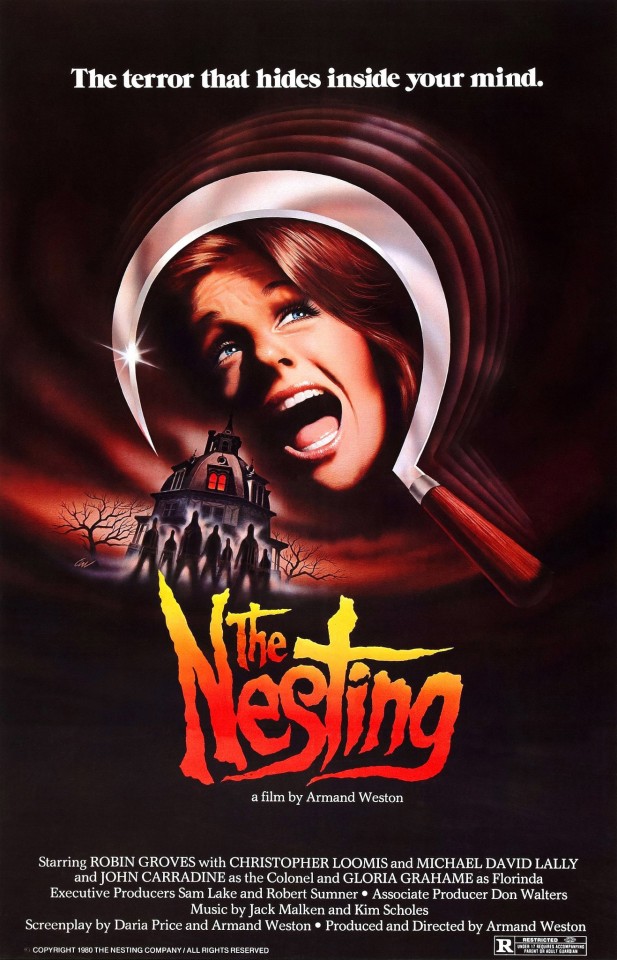
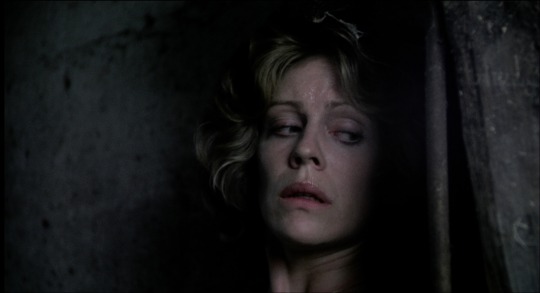
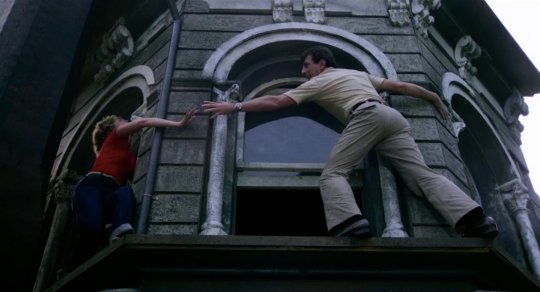
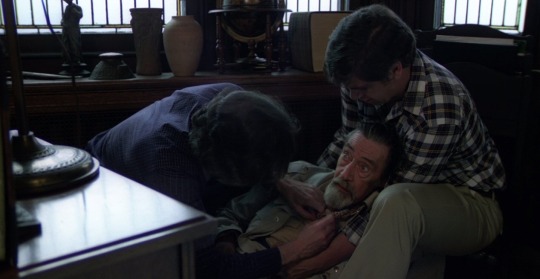
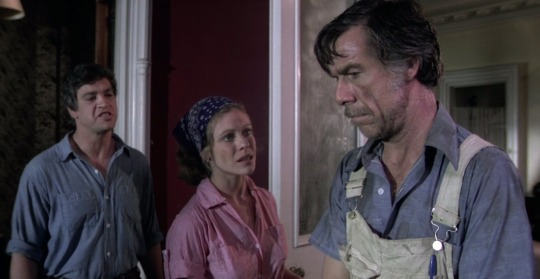
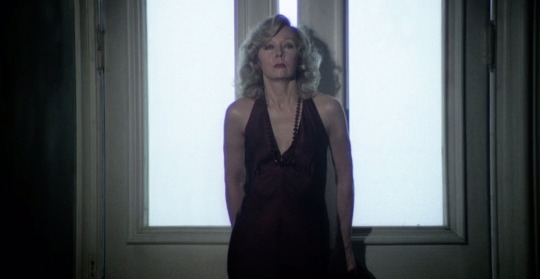
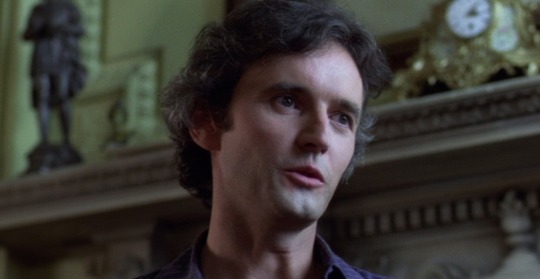
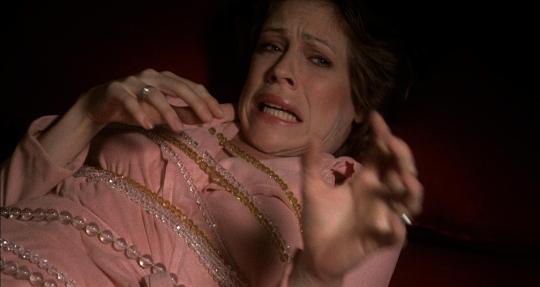
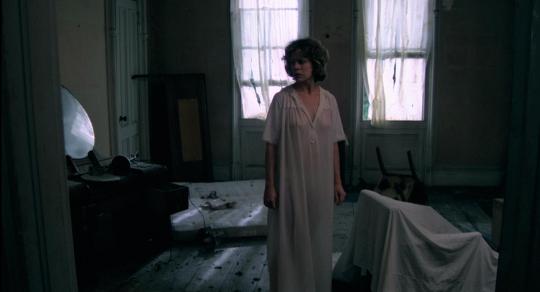

The Nesting (Massacre Mansion, 1981)
"It may come as a surprise to you that a physicist could even contemplate the existence of paranormal phenomena."
"But you admit to the possibility."
"I admit the possibility of the unknown. I admit that science is only beginning to understand its own discoveries. But I do not believe in evil spirits or painted phantoms in windows."
#the nesting#massacre mansion#1981#horror imagery#video nasty#american cinema#horror film#armand weston#daria price#robin groves#christopher loomis#michael david lally#john carradine#bill rowley#gloria grahame#david tabor#patrick farrelly#bobo lewis#june berry#ann varley#cecile liebman#ron levine#kind of weird that genuine old Hollywood legend Gloria G made two video nasties; that both were released (in some territories) as Massacre#Mansion is pure bizarre. of the two this is the better: it looks like an actual quality production‚ certainly one of the most polished#films to grace the dpp list. it's a strangely handsome film and its old fashioned spookery puts you in mind of contemporaneous big budget#horror efforts like John Irvin's Ghost Story (albeit with rather more sex and gore). there's an emphasis on haunting weirdness and#psychological drama over the real graphic stuff which again lends this a sheen of.. professionalism? idk how else to put it‚ compared to#all the indie schlock it was rubbing shoulders with on the list‚ this feels like major studio popcorn fare (of course it isn't quite that)#disappointingly most of the really interesting strands get dropped by the final act which plays out much like any other slasher of the time#but the cast (largely unknowns) are all very game and old hands Carradine and Grahame are of course good value
11 notes
·
View notes
Quote
The cinema does not obey the same schedule of contemporaneity as the novel; thus, it would appear anachronistic to us if someone wrote a novel like Jane Austen, but it would be very “advanced” if someone makes a film which is the cinematic equivalent of Jane Austen. This is no doubt because the history of films is so much shorter than the history of narrative fiction; and has emerged under the peculiarly accelerated tempo at which the arts move in our century.
Susan Sontag, "A Note on Novels and Films"
4 notes
·
View notes
Note
4 & 9 for the historical asks?
4. Favourite historical era?
1930s-1950s, but I'm also developing strong interests in the seventeenth and nineteenth centuries lately, mostly because of the museums I work/have recently worked at, and I have a longer-standing interest in the High and Late Middle Ages (and contemporaneous events in Asia) as well.
9. Favourite historical film?
My favorite movie in the historical fiction genre, if that's what this is asking, is probably either Francesco, giullare di Dio or A Room with a View.
I’ve seen plenty of “Tumblr Ask Challenges”, but none involving history. What a shame…
#history#movies#francesco giullare di dio#the flowers of st. francis#a room with a view#give me love give me memes#starspray
5 notes
·
View notes
Text
The Evangelical Identity of American Christianity
Old Glory Club and Evangelical Mystics
Nov 20, 2024
By guest author Evangelical Mystics.
The 19th-century Gospel song “Old-Time Religion” is representative of the peculiar fruit of religious Americana. The traditional English Gospel music of the 18th century was appropriated by contemporaneous and later Negro Spirituals, which in turn gave way to Southern Gospel music.1 “Old-Time Religion” is an example of the fruit of this development. The song is rather old-fashioned and by many accounts (including mine) entirely unsuitable for corporate worship. But it provides a helpful snapshot of a period of religious fervor from one point in history that has been largely rejected, particularly in our time. I first encountered the song at the beginning of Stanley Kramer’s 1960 film Inherit the Wind, a fictional (and farcical) dramatization of the introduction of Darwinism into the American public school system. The message of the film, of course, was that the “old-time religion” was something for backward Neanderthals, while enlightened progressives subscribed to the conventions of modern science. The film’s propaganda notwithstanding, its use of this piece of iconic Americana folk religion belies the modern sentiment that the traditional American religion is passé and in need of dramatic reform.
Perhaps ironically, the original English Gospel music genre that gave way to the Spiritual was itself part of the “Great Awakenings” or “Evangelical Revival” movements that raptured the American religious sphere in the 18th through 20th centuries. Although the heirs of these movements were the objects of ridicule intended by Inherit the Wind, they shared with the film the general sentiment that the religious mores of our Western tradition had to give way to progressive enlightenment. To the Revivalist, America’s classical religion was passé and in need of dramatic reform.
2 notes
·
View notes
Text
Before the film’s release last month, Cooper’s prosthetic schnoz drew criticism from many Jews, alert to the re-emergence of a hateful caricature that had trailed them for centuries, often attached to actors. It wasn’t so long ago that gentiles playing Shylock in William Shakespeare’s “The Merchant of Venice” did so in “Jewface,” with a large and pendulous hook nose meant to telegraph animality and greed. (Shakespeare describes Shylock variously as a “wolf,” a “cur” and a “cutthroat dog.”) Whether the actor who originated the role in the 1590s wore a wax honker is unknown, but the stereotype was certainly familiar by then. In Christopher Marlowe’s nearly contemporaneous “The Jew of Malta,” the title character’s Moorish slave says, “Oh, brave master, I worship your nose for this.”
Even without the noses — and despite, in Shakespeare’s case, the mitigating poetry — both plays are viciously antisemitic. There’s a reason “The Merchant of Venice,” according to some historians, was the most produced Shakespeare play in Germany during the Third Reich. As the theater scholar Farah Karim-Cooper notes in her book “The Great White Bard” (2023), audiences are strongly influenced by disinformation onstage. In a 2010 study she cites, playgoers in Sweden, Germany and England were asked to evaluate the statement “The reason for antisemitism is the behavior of the Jews in history” both before and after seeing “Merchant.” One out of four found the statement “more correct” afterward. And Shylock was seen as a “typical” Jew by nearly a third.
#shakespeare#william shakespeare#merchant#the merchant of venice#bradley cooper#shylock#anti semitism#theater#theatre#the jew of malta#marlowe
16 notes
·
View notes
Text
Godzilla vs King Ghidorah [ゴジラvsキングギドラ] (1991)

Is it truly a ripoff if the scenes that are blatantly torn from other movies are some of the funniest shit I’ve ever seen? Buried deep within this gently absurd entry into the otherwise serious Heisei journey is a clip reel of all of Hollywood’s greatest hits circa the late 1980s and early 90s. Terminator? You got it, as villainous turned suddenly heroic android M11 escapes a burning car and sprints at superhuman speed to catch our heroes, equal parts T-11 and Ash from Alien (though his physique is more in that latter category, to be sure). Mustache-twiddling corpo-villains control the levers of power from the shadows. And our himbo hero says “Go on… make my day” as he shoots a thing on the UFO. This is pop culture fed through a pipeline of cable TV shows and imprinted upon impressionable minds. This is the stuff of Turbo Kid or maybe Psycho Goreman, earnest pulp homage made from a loving place, though this is more contemporaneous. All the same, I couldn’t classify this in good faith as an Asylum type film by any stretch. It simply cares too much. To that end, I also have to shout out the commitment to making a bunch of artificially inserted cute marketable creatures for the express purpose of making them the primary antagonist.
But the roots of Godzilla, no matter how goofy the outcome, have always been in existential horror and trauma. In its more serious veins, this film attempts to reconcile with the burgeoning economic successes of a Japan venturing into the 21st century. A figure who survived the initial incarnation of this avatar of destruction has gone on to become a corporate mogul and the harbinger of his own sort of terror as he owns nuclear weapons of his own. Godzilla was his savior in the Pacific Theatre, and becomes his executioner in the final moments, the two seeming to share a moment. Crucially, shockingly, King Ghidorah is briefly glimpsed destroying Hiroshima, the Atomic Bomb Dome visible in the foreground as these conquerors from the future seek to put Japan in her place. This is about resilience and defiance, uncertainty about how to move forward as a potential economic superpower.
Akira Ikufube’s score absolutely rips. Aside from the plodding, inevitable Godzilla theme, the opening sequences especially are rife with a dense and frenetic score. It has such interesting instrumentation compared to the usual reliable hits, opening on bass-register piano, timpani, and contrabassoon before being reinforced by a denser palette of woodwinds and pitched percussion than typical. Godzilla is evolving, and so are his harmonic sensibilities.
THE RULES
SIP
Someone says 'UFO' or 'dinosaur'.
A time jump occurs.
Close-up of the Dorats.
Time paradox shit.
BIG DRINK
Blatant, amazing, bizarre Hollywood reference.
DO YOU BLEED, GODZILLA?
Flawless early 90s computer graphics.
#drinking games#king ghidorah#godzilla#heisei godzilla#action#action & adventure#sci fi#sci fi & fantasy#kazuki omori
2 notes
·
View notes